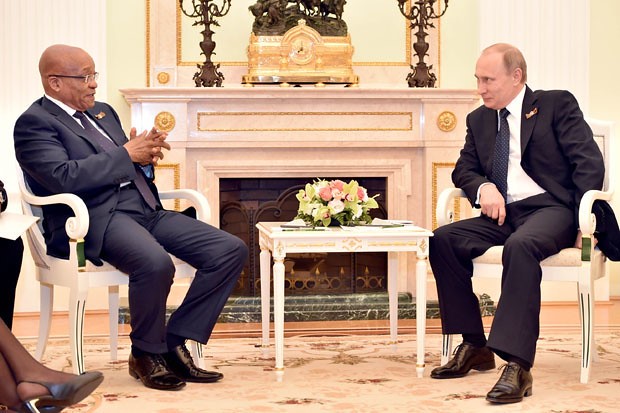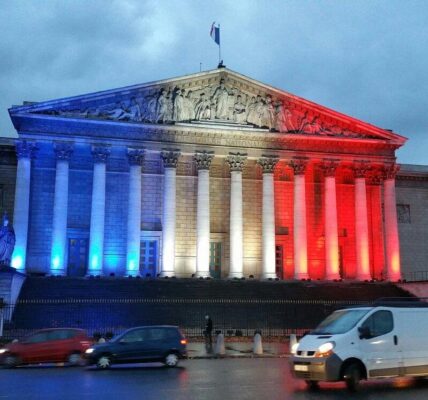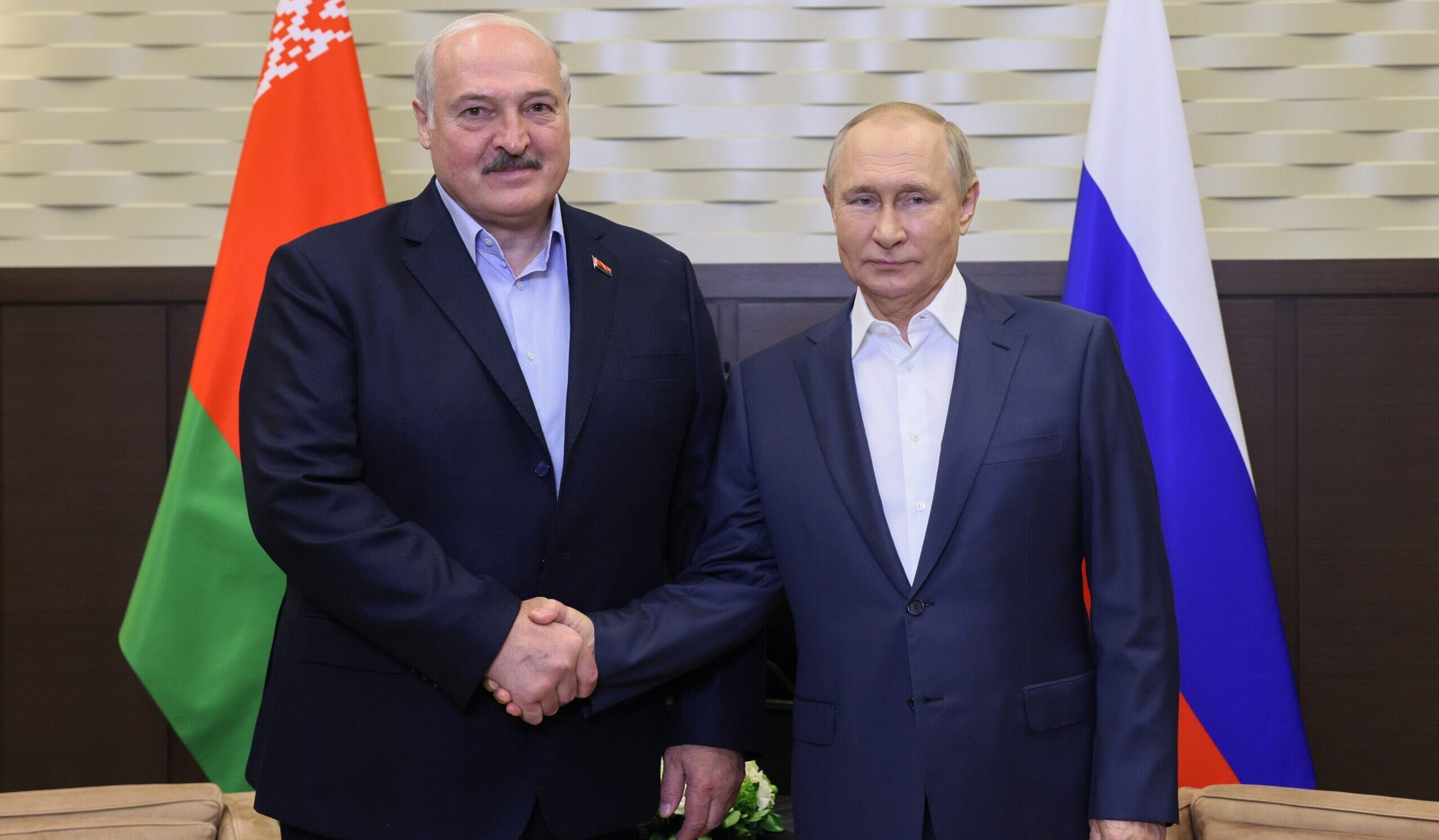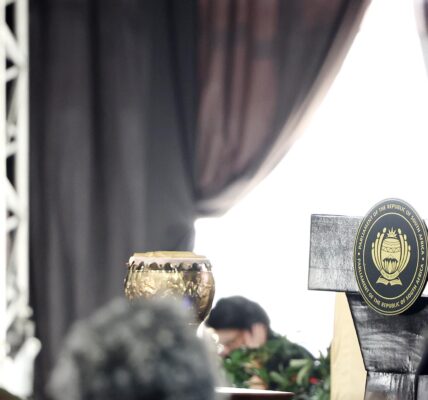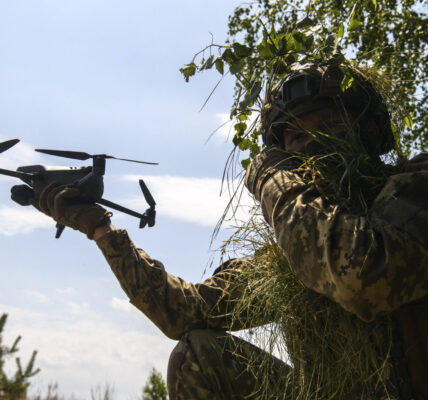Jacob Zuma’s MK is not a South African democratic political party, it is a Russian “hybrid warfare” platform
OP-ED by Andre Pienaar, Co-founder of the Directorate of Special Operations (the Scorpions).
Up to a million Russian controlled social media accounts are active daily in supporting the election campaign of Jacob Zuma’s MK party, the new service Bloomberg has reported.
MK is the only South African party whose campaign is being endorsed by a foreign government and its agents on social media. This is no surprise, because as I wrote earlier, MK is the first political party in democratic South Africa to have been created by a ruthless foreign intelligence service, Russian Military Intelligence, formally known as the Main Directorate of the General Staff of the Armed Forces of the Russian Federation or Главное управление Генерального штаба Вооруженных Сил Российской Федерации, or Glavnoye upravleniye General’nogo shtaba Vooruzhennykh Sil Rossiyskoy Federatsii or GRU for short.
To put this into some perspective, the GRU is the same intelligence service which carried out the Salisbury Novichok poisonings, in March 2018. Two GRU agents attempted to assassinate Sergei Skripal, a former Russian military officer and double agent for the British intelligence agencies.
The GRU created the Wagner Group that operated as a private military company across Africa, and that is now, since the assassination of Progozhin, under the direct control of the Russian Ministry of Defence called the Africa Corps. The GRU and the Wagner Group also created the Internet Research Agency (IRA – Агентство интернет-исследований), also called Glavset (Главсеть), and known in Russian internet slang as the Trolls from Olgino (Ольгинские тролли) or Kremlinbots (Кремлеботы), which launched hundreds of internet trolls to proliferate Russian propaganda covertly online in different operations around the world. This is the same network that now supports Zuma and the MK party online.
President Zuma’s close working relationship with Putin, and Zuma’s failed attempt to be of service to Putin by foisting a massive corrupt Russian nuclear deal on South Africa from 2008-2017 is a matter of public record.
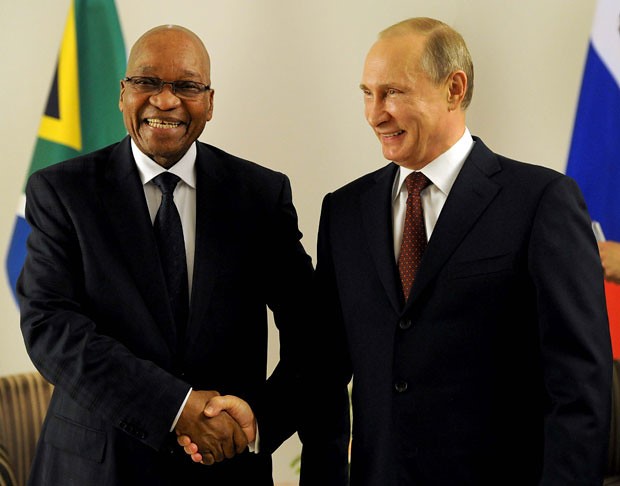
Jacob Zuma was the first intelligence chief to have become a President of South Africa having led the Department of Intelligence and Security (DIS) of the ANC in exile. It was easy for Putin and Zuma to find each other- they are both Russian trained intelligence officers, who have each become heads of state. As one Russian intelligence officer said “Unlike the erudite and British educated Mbeki, Zuma resembles the thugs we know in our neighbourhood”.
Putin undertook training as an agent handler by the First Chief Directorate (foreign operations) of the KGB and Zuma was trained as an agent by the sister service of the KGB, the GRU’s Fourth Directorate (Africa). In the culture of these two intelligence services, both men are ideologically aligned as they both reject the limitations that constitutional democracy places on political power and the values of modernity. Both men pride themselves on being traditionalists, putting traditional values first despite their shared track record of polygamy. Both men also have Crimea in common – Putin as a target for military conquest, and Zuma because he had clandestine training with the GRU at a secret base in Crimea during the Cold War.
Zuma was one of more than 15,000 Africans trained by the Russian intelligence services during the Cold War at a secret military base in Crimea called Centre 165. Unregistered flights would land late at night in Crimea, carrying groups of young men, who had been recruited and selected for clandestine training. On the tarmac, buses with their blinds drawn waited to transport the new “students” to a secret training base, Centre 165 in Perevalnoe, a village in Crimea.
The village was home since 1965 to the largest Russian training centre for fighters from African liberation movements, holding 500 students at any one time. Some 15,000 fighters were trained there in the 26 years it was open, including from the African Party for the Independence of Guinea and Cape Verde, the Popular Movement for the Liberation of Angola, the African National Congress party in South Africa and the Liberation Front of Mozambique.
Training was intense and supervised, run by officers from the KGB and the GRU. Students had to get up at 6am each day and do an hour of gymnastics before breakfast followed by five consecutive hours of military and intelligence exercises. After lunch, students did paperwork or worked on the grounds until dinner time, then watched screenings of Soviet films. Training continued after nightfall, when students learned skills such as how to cross minefields in the dark. Operatives studied the Russian language, Marxism, Leninism and the history of revolutions around the world.
Although the centre was considered a highly effective method for spreading Soviet influence and targeting, it disappeared after the USSR collapsed in 1991 into the secret history of the Russian intelligence services. Students who were trained there and who “sometimes still occupy management positions in their country’s military apparatus, do not admit to having been trained in the Soviet Union”, historian Natalia Krylova wrote in her extensive 2017 study on the Perevalnoe training centre.
It would therefore be a grave mistake for South Africans to think of MK as just another new small party in the South African political landscape. Zuma does not think like any of his opponents in the upcoming elections. Zuma’s mind is filled with Russian intelligence tradecraft honed by his handlers first during his training and then over decades in countless clandestine meetings. This training and experience now make him, despite his advanced age, a valuable asset to the GRU as it escalates its hybrid warfare strategy across Africa.
To understand what Zuma and MK are up to, you have to understand the Russian concept of “hybrid warfare”. The GRU defines hybrid war as a “strategic-level effort to shape the governance and geostrategic orientation of a target state in which all actions, up to and including the use of violence and force, are subordinate to a planned information campaign.”
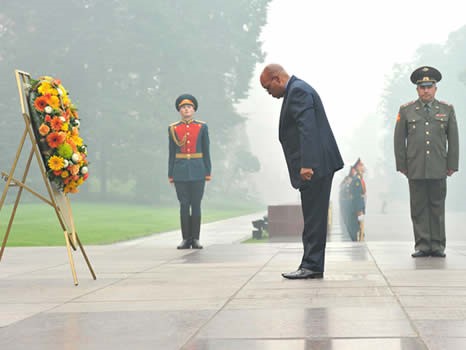
The Kremlin thinks about its war of aggression in Ukraine as a hybrid war because, despite its massive armed invasion, the war is primarily being fought through information operations that targets Ukraine and its allies. The disruption of vital US military supplies for Ukraine through the activities of just 8 Republican members of Congress is one example of Russian information operations. But this is also how the Kremlin thinks about its interference in elections across the Western democracies, and simultaneously, the conflicts in Syria, Libya, Sudan, Niger, Mali, Burkino Faso, and the Central African Republic. Now add South Africa to this list.
Russian hybrid warfare operators think big. It is targeted at the capture of whole states and nations. The strategic objective of hybrid warfare is state capture. The essence of hybrid warfare is to extend influence at the highest level by multiple overt and covert tools that will rupture the existing systems of governance and the country’s alliances. It does not matter what follows, violence and chaos create an opportunity for influence and profit for the nihilists in the Kremlin.
Zuma’s MK thrives on the key ingredients of Russian hybrid warfare- ethnic polarisation and mobilization, the militarization of democratic politics, threats and intimidation, violence, kidnappings and assassinations, and disinformation. MK resembles the Russian sponsored militias of the Donetsk and Luhansk regions of Ukraine, with their cult of the autocratic leader and armed ethnic mobilisation. It looks more like RENAMO or UNITA than any party a democratic South Africa produced. MK’s overt activities are combined with covert financial and propaganda support from the Kremlin through the GRU’s global and local networks using artificial intelligence and cybersecurity operations.
The MK’s outreach to Afrikaners is a typical Kremlin propaganda ploy to try and co-opt what it believes to be an aggrieved minority, who could be duped into believing that Zuma and Putin stand for traditionalist values. Fortunately, this has only attracted the likes of Louis Liebenberg. Afrikaners, like all other South Africans, became significantly poorer during the chaos of Zuma’s two previous terms as President.
Zuma and MK’s political objective is simple. It is a “constitutional coup” to grab power as a minority party with about 13-15% of the national vote by becoming the kingmaker following the May elections. Zuma and his handlers are already actively working behind the scenes in secret talks to try and persuade carefully selected and targeted ANC leaders to form a new government with MK. In these secret talks all means of persuasion available are being used, including threats, intimidation, and financial inducements of the targeted ANC leaders. Failing the execution of this plan for a “constitutional coup”, MK’s ‘Plan B’ is to attempt to violently destabilise the country through ethnic mobilisation as its spokespeople frequently threatens to do.
The second attempt at state capture will be even more dangerous. Ethnic mobilization and polarization were a subtext in Zuma’s previous attempt at state capture. This time round, it is a main theme. It is as toxic as Russian nuclear waste and can damage the South African nation for generations to come.
What can South Africans do? Ordinary South African have shown that we can do extraordinary things. The South African people have previously defeated Zuma and one of the most ruthless murderous foreign intelligence services in the world through peaceful resistance. This courageous peaceful resistance campaign is now a case study for other countries threatened by the GRU’s machinations well documented by the Carnegie Foundation in 2019.
All South Africans and all political parties now have to come together to ensure successful peaceful elections. All the democratic political parties and leaders could come together with the support of civil society, organised labour and the private sector to form a new Government of National Unity (GNU). This is the only way to prevent state capture from happening to South Africa again. Such a GNU could initiate a process of imaginative economic and constitutional reform for which South Africa as a modern democracy was once renowned. These talks to form a GNU should start now and not wait for the election results. All democratic leaders should campaign in such a way that this is a possible outcome. Unity and voting for peaceful change at the ballot box is now the only way to secure the future of the Rainbow Nation for generations to come.

